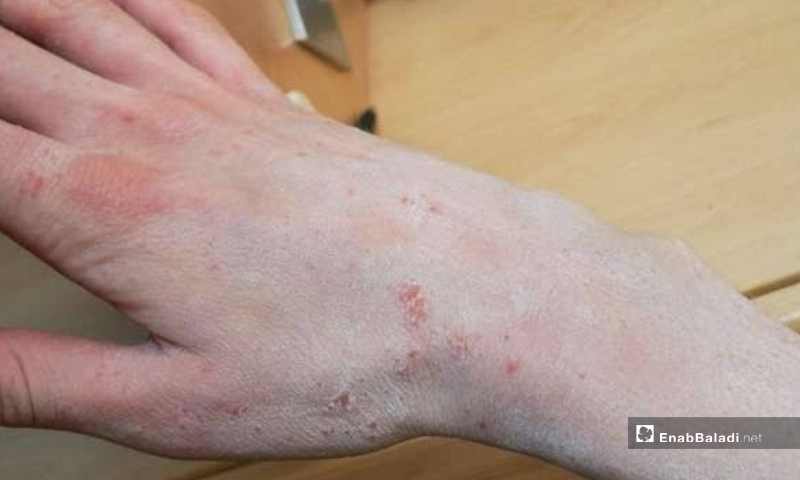



Idlib – Shadia al-Tataa
Ahmad al-Sheikh, a Syrian father residing in the “al-Karama” camp for the internally displaced persons (IDPs) in northern Syria, stands helpless in the face of the pain gripping his two little children after he resorted to several doctors in vain. Meanwhile, the odors of the accumulated waste near the camp linger in his nose, reminding him of the source of which the mites came from and caused his children scabies.
Thousands of families were forced to leave their homes in the southern and eastern rural areas in Idlib, seeking safety and shelter in the north, after the recent military advancements by the Russian-backed Syrian regime forces. Nevertheless, they faced a harsh reality of overcrowding, high cost of living, and lack of resources and tents that forced hundreds of these families to settle in unserved camps.
Two hundred tents have been set up in al-Karama camp in Sheikh Bahr town in the northern countryside of Idlib, in which about 50 people suffered from the relentless itching and pains of scabies mites, including al-Sheikh’s two children.
Al-Sheikh said to Enab Baladi that the uncontrolled accumulation and burning of garbage by the displaced people in the camp, along with limited sanitation facilities, were the leading causes of the spread of the disease.
Hani al-Jabi, the al-Karama camp director, told Enab Baladi that residents of camps sought health aid from the humanitarian organizations functioning in the northern countryside of Idlib to treat patients with scabies; however, they received “only promises with no response on the ground.”
Therefore, the displaced families found no solutions but to use medications of livestock to treat scabies in humans, as the geographical location of the camp, and its far distance from the landfill, impeded the proper disposal of their waste, leading to the spread of scabies, al-Jabi believes.
The camp director also added that the insufficient attention paid by parents while taking care of their children and the failure to follow doctors’ instructions contributed to the spread of the disease too.
The scabies is a skin infestation caused by a parasite mite known as the Sarcoptes scabiei that reproduces on the surface of the skin and then burrows into the epidermis of it and lays eggs “causing intense itching that gets worse at night,” according to the general physician at the Mental Health Unit of the Syria Relief and Development organization (SRD), Khaled Ramadan.
In an interview with Enab Baladi, Ramadan pointed out that the scabies is a rapidly transmitted and contagious disease that happens by close physical contact between family members, school students, nursing homes, camps, and prisons.”
Despite the absence of accurate numbers of patients with scabies in the camps, Ramadan thinks that there is a “significant” increase in their numbers due to the overcrowding of the IDP population, the lack of health awareness, and medical services.
According to the physician’s opinion, the solution to eradicate the disease is conducting “a comprehensive campaign for all camps, schools, and overcrowded places,” as well as providing medications to all family members of the patients, even if they do not show any signs or symptoms of scabies illness, as they may be in the incubation period of the disease.
Humanitarian organizations in the health sector have shifted their funding for various health activities to confront the novel coronavirus pandemic (COVID-19), according to a report issued by the United Nations Office for the Coordination of Humanitarian Affairs (OCHA) on 27 March.
Scabies was not listed among the most prevalent diseases in the northwestern camps of Syria previously; however, the pressure of overcrowding and further influx of people to the official and informal IDPs camps, which have received about one million displaced people since December 2019, caused the lack of services that the IDP population gets.
According to OCHA’s report, IDPs camps of northwestern Syria need substantial allocations to increase access to water, sanitation, and knowledge of proper hygiene practices. The report also pointed out the lack of adequate waste disposal for more than 64,000 people, the need for more than 32,000 to sanitation facilities, and more than 108,000 to cleaning and hygiene supplies.
if you think the article contain wrong information or you have additional details Send Correction